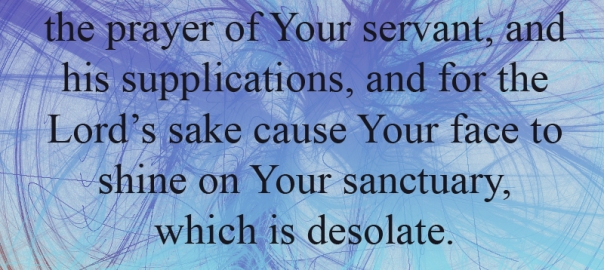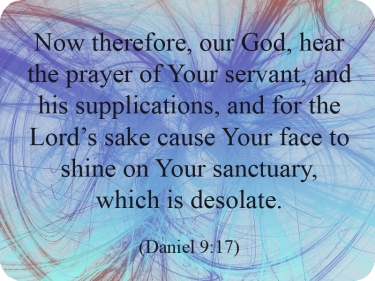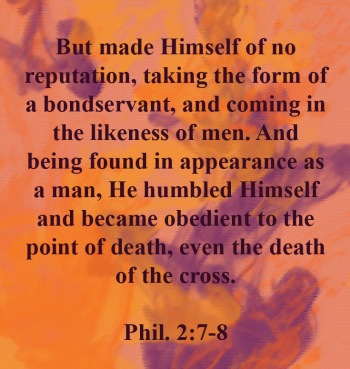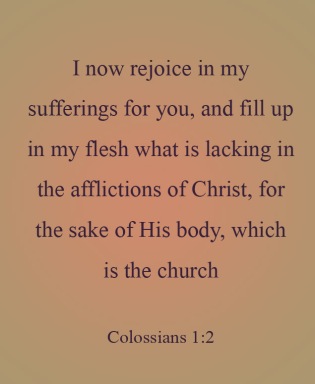 One of the most perplexing questions we can ponder is, “Why does God allow us to experience so much pain and suffering in the church?” We all know someone in the churches of God who is really going through an agonizing health trial. Some are relatively short term trials, but others go back decades, and have caused years of intense pain and suffering. I know one man who has had Rheumatoid arthritis for 35 years, and has endured seven joint replacement operations. He is now on the strongest pain medication made, and even with that, he can barely endure it. The side effects of the meds are taking their toll too. He’s had two strokes, congestive heart failure, Chronic Obstructive Asthma, and has almost died of septic shock at least 3 times in the past two years. In spite of all of that, he’s one of the most inspiring examples of humble, unselfish service to the church I’ve ever known.
One of the most perplexing questions we can ponder is, “Why does God allow us to experience so much pain and suffering in the church?” We all know someone in the churches of God who is really going through an agonizing health trial. Some are relatively short term trials, but others go back decades, and have caused years of intense pain and suffering. I know one man who has had Rheumatoid arthritis for 35 years, and has endured seven joint replacement operations. He is now on the strongest pain medication made, and even with that, he can barely endure it. The side effects of the meds are taking their toll too. He’s had two strokes, congestive heart failure, Chronic Obstructive Asthma, and has almost died of septic shock at least 3 times in the past two years. In spite of all of that, he’s one of the most inspiring examples of humble, unselfish service to the church I’ve ever known.
But every time I’m with him, that nagging question comes into my mind. Why him??? Why so much pain and suffering for so nice a guy?
This is one of those deep cosmic questions that men and women have been crying out in the darkness for an answer to since the time of Adam. Only the One who created the Cosmos has an answer that provides any comfort at all.
The Suffering Body
We all were advised to “count the cost” Luke 14:28, as we considered baptism into the Body of Christ. In Romans 8, we’re told what it costs to become glorified with Christ. … what it takes to join with Him in the family of God. Here, we find the Greek word sumpascho translated as “suffer with”. It refers to an intimate sharing within a Body made up of the called out ones (the ekklesia, the church). The next verses indicate that the reward for doing this will be well worth it.
and if children, then heirs—heirs of God and joint heirs with Christ, if indeed we suffer with Him, that we may also be glorified together. For I consider that the sufferings of this present time are not worthy to be compared with the glory which shall be revealed in us. For the earnest expectation of the creation eagerly waits for the revealing of the sons of God. For the creation was subjected to futility, not willingly, but because of Him who subjected it in hope; because the creation itself also will be delivered from the bondage of corruption into the glorious liberty of the children of God. For we know that the whole creation groans and labors with birth pangs together until now. Not only that, but we also who have the firstfruits of the Spirit, even we ourselves groan within ourselves, eagerly waiting for the adoption, the redemption of our body. (Rom. 8:17-23)
So, we “suffer together, with Him” and with each other. How does that happen? We don’t endure crucifixion, scourging, and crowns of thorns – – so what do we go through together that equates with this word “sumpascho” — to experience pain jointly or of the same kind.
We find a clue to the answer to that question in the only other place in the New Testament where sumpascho is used, and that is in the description of the functional Body of Christ in 1 Corinthians 12. This whole chapter tells us how we are to function as a unified Body. Verses 1-11 tell us the purpose and the use of the gifts of the Holy Spirit for the common good. Then verse 12 begins to instruct us about joining together in one unified Body devoted to the well-being of every member.
That there should be no schism in the body, but that the members should have the same care for one another. And if one member suffers, all the members suffer with it; or if one member is honored, all the members rejoice with it. (1 Cor. 12:25-26)
“Suffer with” is this word sumpascho again, “to experience pain jointly”. Notice, it says ALL of the members suffer with the one enduring the trial. So we can begin to see at least one purpose for some of the things some of us are enduring. All of us in the Body are to learn real EMPATHY for others.
Christ’s Sympathy
The book of Job teaches us about the natural human reaction to the suffering of a fellow Christian. the way Job’s friends reacted to his trials and affliction is typical — “It’s God’s punishment for something YOU did wrong, Job.” But God didn’t see it their way, and neither did Jesus agree with His disciples when they made a similar statement.
Now as Jesus passed by, He saw a man who was blind from birth. 2 And His disciples asked Him, saying, “Rabbi, who sinned, this man or his parents, that he was born blind?”
Jesus answered, “Neither this man nor his parents sinned, but that the works of God should be revealed in him. (John 9:1-3)
How might the “works of God” be made manifest among us today?
For the word of God is living and powerful, and sharper than any two-edged sword, piercing even to the division of soul and spirit, and of joints and marrow, and is a discerner of the thoughts and intents of the heart. And there is no creature hidden from His sight, but all things are naked and open to the eyes of Him to whom we must give account. (Heb. 4:12-13)
This is how personal Christ wants our lives “IN HIM” to be … everything about us, completely open and honest … nothing withheld, and … KNOW HIM intimately as we walk through life at His side, with His words to guide us.
Seeing then that we have a great High Priest who has passed through the heavens, Jesus the Son of God, let us hold fast our confession. For we do not have a High Priest who cannot sympathize with our weaknesses, but was in all points tempted as we are, yet without sin. Let us therefore come boldly to the throne of grace, that we may obtain mercy and find grace to help in time of need. (Heb. 4:14-16)
Jesus went above and beyond the call of duty to show Himself as a sympathetic companion to us in life. The word “sympathize” here is another sum- word. We covered sumpascho (to suffer together with, to experience pain jointly), and here we have sumpatheo (to commiserate with, have compassion, to be touched with our feelings).
When we “come boldly to the throne of grace” God learns a lot about us … what our prayers are focused on, how much “like His Son” we are becoming”, and how much empathy we have for our suffering brethren who are enduring unimaginable trials. In the pain and suffering in today’s Body of Christ, you and I can learn from the example of Christ Himself to FEEL and EXPRESS sumpatheo, as He so often did during His encounters with people who were dealing with serious illness.





 I’d like to do something in today’s blog post that I’ve never done before – to recommend a book entitled “In His Image” by Dr. Paul Brand and Philip Yancey. As a Christian, I’m always seeking a better understanding of my God, His Christ, and the Body that they have called me to be a part of. In fact, discerning the “Body of Christ” is critical to our remaining a healthy part of that Body as we mature in the faith which was once delivered.
I’d like to do something in today’s blog post that I’ve never done before – to recommend a book entitled “In His Image” by Dr. Paul Brand and Philip Yancey. As a Christian, I’m always seeking a better understanding of my God, His Christ, and the Body that they have called me to be a part of. In fact, discerning the “Body of Christ” is critical to our remaining a healthy part of that Body as we mature in the faith which was once delivered.